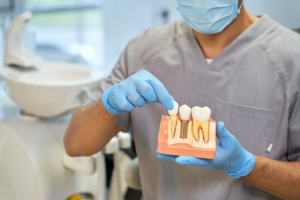
Tooth ache: Are dental implants the best option?
Are you having a tooth pulled? Or lost some teeth in an accident? Or simply don’t like the way your teeth look? Your dentist may suggest dental implants.
While there are good health reasons for replacing a missing or extracted tooth (or teeth) as soon as possible, it’s important to understand what dental implants are and what is involved in the procedure.
There are also alternatives that you should discuss with your dentist. Dental implants are very expensive and if they don’t work, they can cause long-term problems. Ensure you are armed with all the right information before you get in that chair.
What are dental implants?
These are essentially artificial tooth roots. Surgically inserted into your jawbone, they serve as a sturdy base to support one or more artificial teeth, known as crowns. A connector, known as an abutment, is placed on top of the implant to hold and support your crowns. The crowns are custom-made to match your natural teeth and fit your mouth.

Dental implants are often recommended for people who:
-
- Have one or more missing teeth
- Have a jawbone that's reached full growth
- Have adequate bone to secure the implants or are able to have a bone graft
- Have healthy oral tissues
- Don't have health conditions that will affect bone healing
- Are unable or unwilling to wear dentures
The primary purpose of dental implants is to replace missing teeth and restore functionality and aesthetic appeal. They can help you chew, smile, talk and look completely natural.
The best way to know if you're a good candidate for dental implants is to consult with a dental professional. They can evaluate your oral health, discuss your goals and guide you through your options.
What are the alternatives to dental implants?
While dental implants can offer a long-lasting solution for tooth loss, you can also opt for:
Dentures
Removable oral prosthetic devices that can replace missing teeth and surrounding tissues, dentures come in two main types: complete and partial. Complete dentures are used when all the teeth are missing, while partial dentures are used when some natural teeth remain.
Benefits: Dentures are typically non-surgical and can be a cost-effective solution for tooth loss. They are generally easy to maintain, requiring only regular cleaning and overnight soaking.
Disadvantages: Dentures may not offer the same level of comfort and stability as dental implants. They can slip or move around in the mouth, affecting speech and eating. Additionally, because they don't stimulate the jawbone like implants do, long-term use of dentures can lead to bone loss.
Dental bridges
This is a dental restoration used to replace one or more missing teeth. It involves creating a bridge between the existing teeth on either side of the gap, supporting a false tooth.
Benefits: Dental bridges are usually less expensive than implants, and the procedure is less invasive. They are fixed in place, so they don't move or slip like dentures can.
Disadvantages: To install a bridge, the adjacent teeth must be filed down, which can damage healthy teeth. They also don't prevent bone loss in the jaw, as they don't replace the tooth root.
How much will the dental implant procedure cost?
The cost varies considerably, depending on factors such as:
-
- Type of implant
- Complexity of the procedure
- Location of the dental practice, as prices vary depending on what area of Australia you live in
But here's a breakdown of the average costs associated with various types of dental implants. Note that the initial consultation cost is typically included in the total cost of the dental implant procedure.
-
- A single-tooth dental implant costs at least $1,000. This may not include the cost of the abutment and crown, which can incur an additional $500 to $1,500.
- The cost of an implant-supported bridge will depend on the number of implants and the type of material used. It’s best to get quotes from multiple dental practices.
- Implant-retained or implant-supported dentures start at $8,000 and could go higher depending on your situation.
- All-on-4 dental implants, which work to replace full arches with just four implants, start at around $17,000 per jaw.
Many dental practices offer financing and payment plans for those not covered by insurance or needing assistance with the cost. These include ZipPay, Humm, Supercare and in-house finance options.
If your private health insurance covers dental implants, your out-of-pocket expenses will depend on your specific coverage and insurance plan. Consult your insurance provider before booking a procedure so you know what they will cover.
Does Medicare cover dental implants?
By and large, Medicare does not cover dental work, including dental implants. The public dental system will provide those in need with dentures.
How long does it take to get dental implants?
The entire process usually takes between five to eight months, sometimes longer, depending on the procedures involved and the healing process. Here's a general guide to what you might expect from a basic dental implant procedure:
Initial consultation
The first step is a comprehensive dental exam. The dentist will examine your mouth, take X-rays and discuss your medical history. This consultation is crucial for determining whether you're a suitable candidate for dental implants.
Dental implant placement
This involves a surgical procedure where the dentist inserts the implant into the jawbone. The surgery is usually done under local anaesthesia and can take one to two hours per implant.
Healing and osseointegration
Following the placement of the implant, a process called osseointegration begins. This is where the jawbone grows around the implant, anchoring it securely in place. This can take several months, typically from three to six months, but is crucial for ensuring the stability and longevity of the implant.
Abutment placement
Once the osseointegration process is complete and the implant is secure, the next step is to place the abutment. This is a small connector post that will hold the new tooth. In some cases, the abutment can be placed simultaneously with the implant. In other cases, separate minor surgery is needed to expose the implant and attach the abutment. There is usually a healing period of about two weeks after the abutment is placed.
Crown placement
The final step is the placement of the crown, which is the tooth's visible part. Your dentist will take impressions of your mouth and create a crown that matches your natural teeth in terms of colour, shape and size. Once the crown is ready, it is attached to the abutment. This process usually takes about two to three weeks.
Follow-up appointments
Expect several follow-up appointments throughout the process to check on the healing progress and ensure the procedure's success. These are essential to maintain the health of the implant and your surrounding teeth.
What are the risks and complications of dental implants?
While dental implant surgery is generally safe and has a success rate of 90 to 95 percent, as with any surgical procedure, it carries some risk of complications, such as:
-
- Infection at the implant site
- Injury or damage to surrounding structures, such as other teeth or blood vessels
- Nerve damage, which can cause pain, numbness or tingling in your natural teeth, gums, lips or chin
- Sinus problems, when dental implants placed in the upper jaw protrude into one of your sinus cavities
Although the risk of complications is generally low, it can increase in patients with certain medical conditions or who smoke, as smoking can hinder healing. According to the Australian Dental Association Guidelines, your dentist must discuss these with you before beginning the procedure.

Minimising and managing risks
The best way to minimise the risks associated with dental implant surgery is to ensure that you are in good health and follow your dentist's instructions before and after the procedure. This includes practising good oral hygiene, following a healthy diet, avoiding tobacco use and attending all follow-up appointments. Also, if you have a medical condition, be upfront about it.
If a complication does occur, it's usually treatable. For instance, infections can be treated with antibiotics and proper oral hygiene; damage to other teeth or nerves usually heals over time or with additional treatments.
Impact of dental implants on lifestyle
Dental implants are designed to function like your natural teeth and can significantly enhance your overall quality of life. They restore the ability to eat and speak properly, which can positively affect your social interactions and nutritional health.
After surgery, you'll need to stick to a soft food diet to allow the site to heal. Foods like yoghurt, pudding and applesauce are good choices. Avoid hot foods and drinks, hard or crunchy foods, and don't use a straw as the suction can disrupt the healing process.
After the healing period, it's still a good idea to be mindful and avoid extremely hard or sticky foods that could damage the crown.
Cleaning and maintaining your implants may also change. Your dentist may require specific cleaning techniques and products, such as:
-
- Interdental brushes - small brushes that can clean hard-to-reach areas around your implant
- Oral irrigators (water flossers) - these devices use a stream of pulsating water to remove plaque and food particles
- Low-abrasive toothpaste - some kinds of toothpaste are specially designed for dental implants and are less likely to scratch surfaces
Remember, while the implant is not susceptible to decay like a natural tooth, the gum tissue around it can still get infected. Regular cleaning and dental check-ups are critical to maintaining the health of your gums and ensuring the longevity of your dental implant.
How long do dental implants last?
Dental implants can last for many years if you care for them properly. According to a study, almost 88 percent of dental implants last 20 years or more.

Dental implants are not guaranteed against failure but many dentists and implant manufacturers offer warranties or guarantees on their work and products. The specifics of these warranties can vary, so discuss this with your dentist during your initial consultation.
If you're experiencing discomfort or pain, let your dentist know immediately. While some discomfort is normal after the surgery, persistent pain or discomfort can be a sign of complications, such as infection, damage to the implant or issues with your bite alignment.
What else should I ask my dentist?
The goal is to feel confident and comfortable with your decision, so don't hesitate to ask any questions or express any concerns you might have. You might consider asking:
-
- Can you provide examples or testimonials from previous patients?
- Can I see before-and-after photos of patients who have undergone dental implant treatment in your practice?
- What type of implant will be used, and why?
- What is the overall timeline for the implant process? How long will it take from the initial consultation to the final restoration?
- What is your plan if the implant fails or if complications arise?
- How can I best maintain my implant to ensure its longevity?
If something goes wrong…
If you experience complications after your dental implant procedure, the first step is determining the cause. Various factors could be at play, including pre-existing medical conditions, procedure issues, implant material failure, or improper aftercare.
It's crucial to discuss any issues with your dentist immediately. They can help determine the cause of the problem and suggest a course of action. If the complications are due to an error during the procedure or a faulty implant, the responsibility might lie with the dental professional or the implant manufacturer.
If you believe your dentist is at fault, you can complain through the Dental Board of Australian Health Practitioner Regulation Agency (AHPRA). You might be able to claim compensation if you can prove a dental professional’s negligence caused any issues. In this case, it would be wise to consult a lawyer specialising in medical negligence.
The manufacturer might be held responsible if it’s proven the implant itself was faulty. Depending on the warranty or guarantee, you might be eligible for a replacement or refund.
If you have already had implants and are experiencing problems, please get in touch and let us help you handle your complaint.






